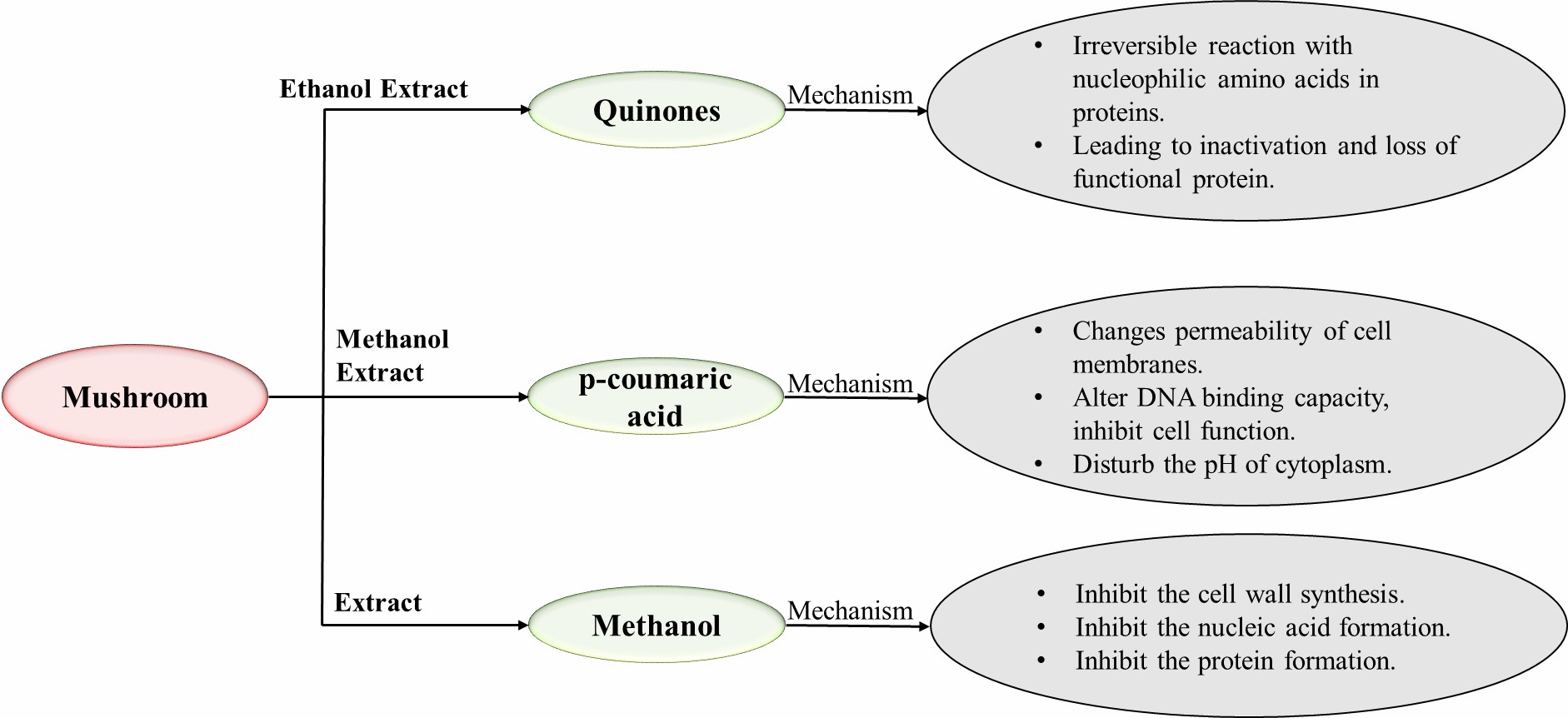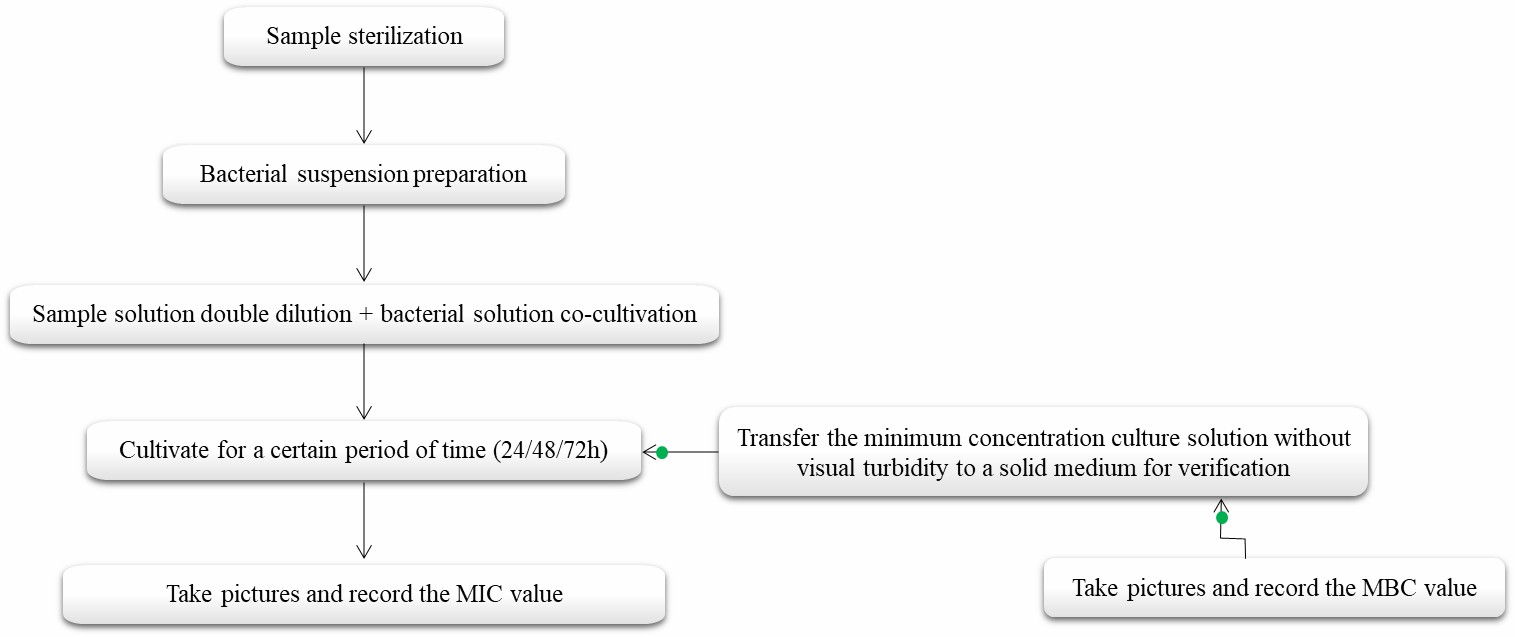Infectious diseases are increasing rapidly all over the world and are among the top causes of death. Unnecessary use of antibiotics, especially the increasing problem of resistance cause difficulties in treatments with antimicrobial drugs. It’s critical to discover new natural compounds for antibiotics. In this regard, mushrooms have proved to be particularly interesting sources of antimicrobial compounds. Therefore, it will be more possible to discover potential antibiotic candidates from mushrooms.
Lifeasible provides one-stop preclinical research services for antibiotic drug development of mushroom extracts. From the extraction and separation of antibacterial active compounds to preclinical mechanism research, we can provide technical support for the development of your drug.
Antimicrobial Mechanisms of Mushrooms
A variety of organic compounds in mushrooms are the material basis for their antibacterial effects. The hydroxyl groups in phenols and phenolic acids determine their toxicity to microorganisms. Quinones can irreversibly react with nucleophilic amino acids in proteins, resulting in protein inactivation and loss of function. Other chemicals, such as p-coumaric acid, affect cell membrane permeability, DNA binding capacity, and cell function by slowing or inhibiting it. Natural extract antimicrobials change the pH of the cytoplasm and have the capacity to damage microbe membranes through their processes. Moreover, mushroom extracts with antimicrobial activity generally involve interactions with bacterial cell wall polypeptides, membrane-bound enzymes, and surface-exposed adhesins to kill bacteria.
 Fig. 1 Antimicrobial mechanism of mushroom extracts. (Agarwal A, et al., 2023)
Fig. 1 Antimicrobial mechanism of mushroom extracts. (Agarwal A, et al., 2023)
Our Services
Lifeasible provides research services for the development of antibiotic drugs from mushroom extracts. Our services include but are not limited to the following:
Extraction and separation of bioactive substances from mushrooms
Provide extraction and separation services of target substances according to your needs to speed up your experimental process.
In vitro antibacterial activity test
We provide the following antibacterial or antibacterial test methods to meet your scientific research needs. The selection of test methods for samples in different states is as follows. If you have other related test needs, you can contact us for a detailed consultation.
- OD value test: suitable for soluble samples without color interference.
- Antibacterial zone test: suitable for samples whose active ingredients can be dissolved.
- Shaking culture + plate coating counting method: can be used to evaluate the antibacterial activity of insoluble samples.
- MIC test: suitable for soluble samples that have been verified to have antibacterial activity and no color interference.
- MBC test: suitable for samples that have been tested with minimum inhibitory concentration.
We offer services to assay the activity of mushroom extracts against the following bacteria and their resistant bacteria, the types of bacteria we can test include but are not limited to the following:
Acinetobacter baumannii
Bacillus subtilis
Bacillus cereus
Escherichia coli
Staphylococcus aureus
Salmonella typhi
Enterococcus faecalis
Helicobactor pylori
Klebsiella pneumoniae
Klebsiella typhimurium
Salmonella enteritidis
Micrococcus luteus
Pseudomonas aeruginosa
Plesiomonas shigelloides
Proteous vulgaris
Streptococcus pyogenes
Antibacterial mechanism research
We perform molecular docking studies on active compounds against target proteins involved in the antibacterial mechanism of action to evaluate their affinity to bacterial proteins and determine the mechanism and target of these compounds.
MIC/MBC Test Process
 Fig. 2 The process of the MIC/MBC test.
Fig. 2 The process of the MIC/MBC test.
Advantages of Our Services
- Various antibacterial test methods can meet the needs of different samples.
- Various clinically common bacterial drug-resistant strains, bring your research closer to the clinic.
- Perfect molecular docking platform.
Contact Us
Lifeasible provides one-stop preclinical research services for antibiotic drug development of mushroom extracts. To help people better understand the health-promoting properties of mushrooms and enhance their use to help prevent and treat human disease. If you are interested in our research services, please contact us for a more detailed description of our services.
Reference
- Agarwal, A.; et al. Aspects of mushrooms and their extracts as natural antimicrobial agents: microbiology. Journal of Microbiology, Biotechnology and Food Sciences. 2023, 12(6): e9191-e9191.
For research or industrial raw materials, not for personal medical use!


 Fig. 1 Antimicrobial mechanism of mushroom extracts. (Agarwal A, et al., 2023)
Fig. 1 Antimicrobial mechanism of mushroom extracts. (Agarwal A, et al., 2023) Fig. 2 The process of the MIC/MBC test.
Fig. 2 The process of the MIC/MBC test. 